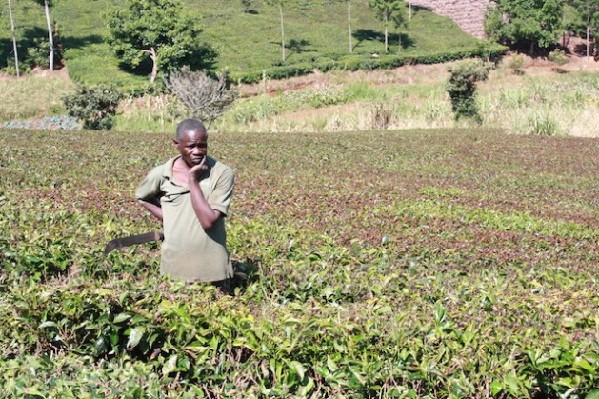The effects of climate change fall especially hard on farmers around the world. In Kenya, rising temperatures, extreme weather and shifting rain patterns are complicating life for some 600,000 small-scale tea farmers. The men and women who grow the world's second-most-popular beverage are being told not to rely on tea alone for their livelihoods.

Alice Kariuki grows tea in Kenya's highlands, a couple of hours north of Nairobi. She says these days, the seasons are harder to predict than they used to be.
"When we are wanting time for rain, it changes and becomes time for sun," said Kariuki.
Kenya is the world's third-largest tea producer, exporting $1.3 billion worth in 2013.
Hundreds of thousands of small-scale farmers work in the tea industry in Kenya. It's the country's largest export industry. But they're already starting to see effects from climate change.
Rising temperatures are damaging tea plants, says agronomist Steven Mwaniki.
"Sun scorching. See? The sun is so hot, leading to scorching," said Mwaniki.
And it's not just heat extremes. Dead, brown fields bitten by frost are more common, too. And damage from insects and diseases is also rising.
"That increase in the number of pests is coming as a result of climate change," said Mwaniki.
It adds up to a major threat to Kenya's tea industry. ETP - the London-based Ethical Tea Partnership - and others published research showing the areas in red will be much less suitable for the crop in 2050 compared to today.
For the average small-scale farmer who plants most of his or her land with tea, deepening poverty is a real risk.
So ETP is advising growers to take a tip from Alice Kariuki.
"No, you cannot grow all the tea. You need the tea, you need the maize for eating. If you plant all the tea, you shall not have much money," she said.
Kariuki's half-hectare plot is jam-packed with not just tea, but cabbages, broccoli, maize and more. She has invested in cows, chickens and goats, and a biogas unit that turns their manure into cooking fuel.
"The animal is giving me milk, money, biogas," said Kariuki.
ETP and others support training for farmers like Kariuki, so she can share her knowledge with her neighbors.
It's going slowly so far, but Steven Mwaniki is optimistic.
"The worst we could have done was to keep silent and pretend as if there is no climate change. But it is good our farmers have realized climate change is with us. And it goes without saying we have to do something," he said.
Something they hope will keep Kenya's tea industry going strong.
Vocabulary
scorching:灼热的
broccoli:花椰菜
来源:VOA
编辑:丁一
上一篇 : Mother Robot Builds Own Children
下一篇 :
关注和订阅


电话:8610-84883645
传真:8610-84883500
Email: languagetips@chinadaily.com.cn